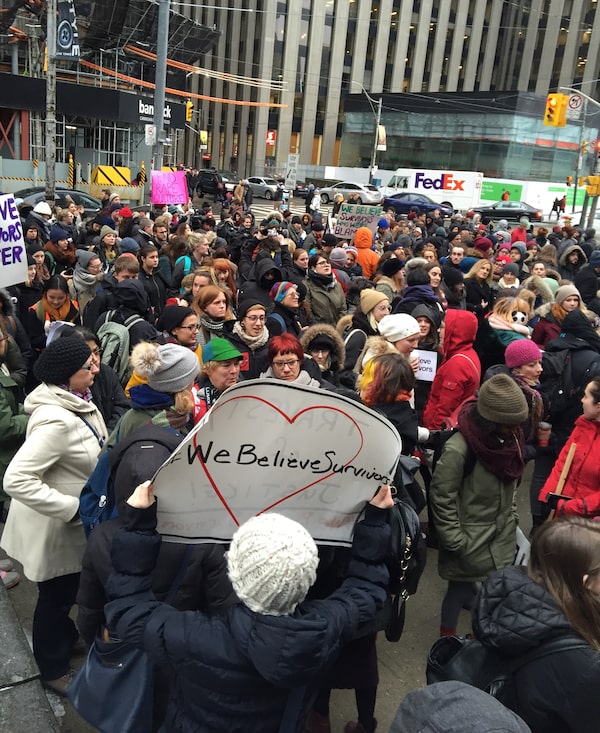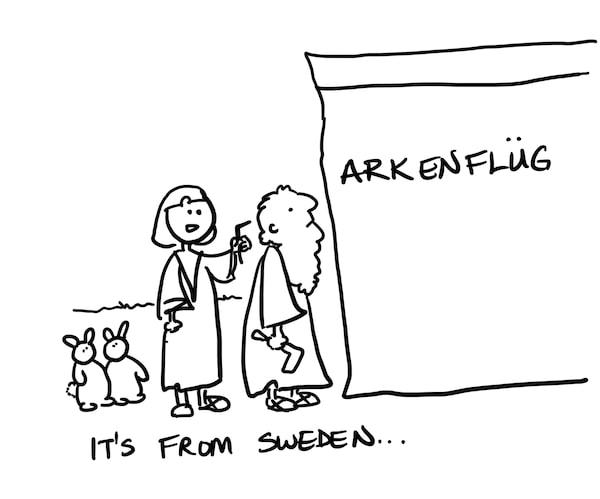This is the weekly Amplify newsletter, where you can be inspired and challenged by the voices, opinions and insights of women at The Globe and Mail, and our contributor community.
Sarah Boesveld is a journalist, communications professional and social advocate.
From a New York courthouse earlier this month, E. Jean Carroll emerged, elated, smiling before a crush of reporters as they sought comment: The jury inside had just found former U.S. president Donald Trump liable for sexually abusing and defaming the 79-year-old nearly 30 years earlier.
It was a very different scene than the one I attended more than seven years ago on the steps of the Old City Hall courthouse in Toronto.
On March 24, 2016 – an overcast day, the clouds spitting a freezing drizzle – protesters hoisted signs aloft and chanted, “We believe survivors.” Inside, Canadian radio host Jian Ghomeshi had just been acquitted on all charges laid against him, which included four counts of sexual assault and one of overcoming resistance by choking.
There was no jubilance outside that courthouse – just anger, shock and confusion. I remember feeling somewhat numb, mostly going through the motions, trying to get all I needed to file a story on the trial as a senior writer for Chatelaine at the time. Once the numbness wore off and the news cycle moved on, I realized how sad I felt at the verdict. The trial was, for me – and perhaps also for anyone following my live tweets of the proceedings – not only a crash course in how Canadian criminal courts handle sexual assault cases, but also akin to watching a car accident happen in real-time. It was raw. It was excruciating. Even in my role as an observer, the memory affects me still.
When the verdict landed, Chatelaine hit publish on an exclusive interview I had conducted with the highest profile complainant to come forward, actor Lucy DeCoutere. While cleaning out my pantry this spring, I found a hard copy of the issue it was printed in. I re-read her account all these years later, of how the experience of taking the stand left her feeling “totally cracked in half.” I sat there on the floor and silently cried.
The Ghomeshi and Trump trials were very different. The Carroll case was heard before a jury in a civil court in the U.S., while DeCoutere and other witnesses testified in a criminal case in which the outcome was determined by a judge. Still, while the cases were heard only seven years apart, it feels as though they happened in entirely different eras.
In the years since the Ghomeshi trial, the public’s response to sexual assault trials and their outcomes has been massively shaped by journalism. The Ghomeshi case was, in many ways, the beginning of Canada’s #MeToo era (a movement started by Black U.S. activist Tarana Burke); it was a time when hashtags like #IBelieveLucy and #BeenRapedNeverReported took hold and encouraged more survivors of sexual violence to speak out.

While reporting on the Jian Ghomeshi trial in March, 2016, Sarah Boesveld snapped this picture of the crowd gathered outside the Old City Hall courthouse in Toronto.Sarah Boesveld
It’s been exciting to see newsrooms give investigative work on sexual violence the seriousness it deserves. The deep reporting by Robyn Doolittle in The Globe’s groundbreaking Unfounded series led to many important procedural and legislative changes in Canada. Had Jodi Kantor and Megan Twohey not so doggedly and bravely chased the Harvey Weinstein story for The New York Times, #MeToo would not have become a social reckoning and Weinstein, arguably, would not be behind bars.
But something has become increasingly clear to me since reporting on Ghomeshi: Even if and when some kind of “justice” is served, it is rarely paired with peace. Despite many people believing their claims, DeCoutere and the two other complainants in the Ghomeshi trial paid a heavy emotional cost in coming forward. Oscar-winning Canadian director Sarah Polley wrote in her memoir Run Towards the Danger that she had decided not to pursue a claim against Ghomeshi. There was a cost to that as well.
Many women who have spoken out against their attackers have faced even more victimization in both the court system and the court of public opinion. Plenty have been hit with defamation lawsuits – a move that intentionally steers focus away from the crime. The rise of the “infotainment” industry has leveraged the power of social media to sway the pendulum of public opinion away from victims like Megan Thee Stallion, who recently testified that Canadian rapper Tory Lanez shot her in 2020, and Amber Heard, who was sued for defamation by her former partner, Johnny Depp. Even Carroll, despite having emerged victorious, still had to hear Trump discredit her during a live CNN Town Hall event (on Monday, she filed another defamation lawsuit based on these comments).
I don’t know what the outcome in the Ghomeshi case would be if it happened today. But I do know there are countless lessons we have all learned since then, thanks to the bravery of the women who came forward (and, I would be remiss not to say, the initial reporting of the Toronto Star). Last year, the Supreme Court of Canada upheld expanded rape shield laws, which now block those accused of sexual assault from ambushing their accuser with surprise evidence or private records like medical files or journals during trial proceedings – a decision partly sprung from the Ghomeshi case.
In the years since reporting from that courtroom, I’ve often thought about how Justice Rosemarie Aquilina, who presided over the 2018 trial of former USA Gymnastics doctor Larry Nassar, invited every single victim to come forward and read a statement. It took nine days and spanned two countries, but 204 victims were given an opportunity to speak despite Nassar complaining to the court. She centred the victims’ experiences in what was a clear case of criminal behaviour. The public couldn’t look away, and that was the point – we all need to see and attempt to understand.
Sometimes I worry that my live-tweeting of the Ghomeshi trial was, itself, a form of “infotainment.” But when I think of the ways our eyes have been opened on this issue in the years since, those proceedings were worth documenting so closely. They were worth bearing witness to, and there is a certain kind of justice in that.
Marianne

Marianne Kushmaniuk for The Globe and Mail
Inspired by something in this newsletter? If so, we hope you’ll amplify it by passing it on. And if there’s something we should know, or feedback you’d like to share, send us an e-mail at amplify@globeandmail.com.